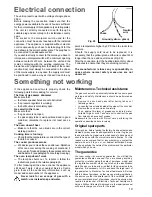
5
Hints and tips
Pottery
Remember that a wide-bottomed pan allows a faster
cooking than a narrow one.
Always use pots which properly fit what you have to
cook.
Particularly make sure that the pans are not too small
for liquids, since these could easily overflow.
Moreover, the pans should not be too large for a faster
cooking. In fact, grease and juices may spread on the
bottom and burn easily.
It is better to use non-openable moulds for baking cakes.
In fact, an openable mould lets juices and sugar leak
through, falling on the bottom of the oven and
consequently burning on the bottom of the baking tray,
making cleaning difficult.
Avoid putting plastic-handled pans in the oven as they
are not heat-proof.
You should use pans with the right diameter to fit the
burner, in order to make the most out of it, thus reducing
gas consumption as in Fig. 4.
It is also advisable to cover any boiling casserole and,
as soon as the liquid starts boiling, lower the flame
enough to keep the boiling point.
Hotplates
Saucepans suitable for use on solid plate hobs should
have several characteristics:
they should be fairly heavy duty;
they should fit the heat area exactly, or be slightly
larger for efficient use, NEVER smaller;
they should have a flat base to ensure good contact
with the plate (see Fig. 5).
This is particularly important when using pans for high
temperature frying or pressure cooking.
Ensure pans are large enough to avoid liquids being spilt
onto the plates.
Never leave the plates on without a pan on them or with
an empty pan on them.
In models supplied with a cover, if it is made of
glass, it should not be closed when the burners are
still hot, as it could splinter.
Fig. 4
Fig. 5





































